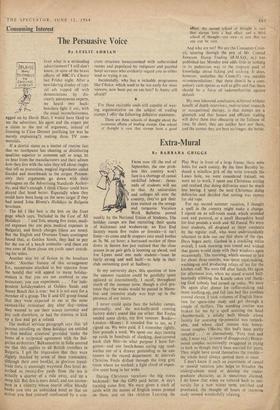Consuming • Interest
The Persuasive Voice
By LESLIE ADRIAN
JUST what is a misleading advertisement? I still don't
know, in spite of the brave
efforts of BBC-1's Choice last Friday night. After a bewildering display of typi-
cal ads topped off with denunciations by dis- creetly anonymous experts, we heard two back- benchers fight it out, with the usual inconclusiveness, egged on by Derek Hart. I would have liked to see the advertiser, his agent and the expert put
,a claim to the test of argument, instead of listening to Clive Donner justifying (or was he merely explaining?) making three TV com- mercials.
If .a dentist states as a matter of routine fact that no toothpaste has cleaning or disinfecting qualities superior to common salt or soap, let us hear from the manufacturers and their admen .how they live with the tales they tell about tingles that tell us protection, magical ingredients called Gardol and mouthwash in the stripes. Presum- . ably their' arguments go down with their • colleagues on the Advertising Standards Author- ity, and that's enough. I think Choice could have played that hand better. Especially when they -could have been bang on the news target if they 'had tested John Bloom's Holidays in Bulgaria brochure.
The bit I like best is the box on the front page which says, `Included in the Cost of All -Holidays . . .' and lists, among five items, medi- cal expenses (no one pays medical expenses in 'Bulgaria), and beach charges (there are none). But the English and Overseas Tours contingent found that, at Golden Sands, they had to pay for the use of a beach umbrella—and there are two rows of them about ten yards apart stretch- ing for miles. Another nice bit of fiction in the brochure reads: 'Another feature of this arrangement [i.e., restaurants attached to but separate from the hotels] that will appeal to many holiday- makers is that you are not confined to one restaurant; you can experiment. . . .' For inde- pendent holidaymakers at Golden Sands and Sunny Beach this is true: but it is not easy for a member of a group. The E and OT group found that they were expected to eat at the same canteen-like restaurant day after day—unless they wanted to use their scarce currency and Pay cash elsewhere, or had the stamina to kick 111) a fuss and get a refund. The medical services paragraph says that `all Persons travelling on these holidays are entitled to free medical attention' provided 'under the terms of a reciprocal agreement with the Bul- garian authorities.' Balkantourist in Sofia assured me that this applies to all British travellers in Bulgaiia. I got the impression that they were slightly shocked by some of these statements; although their own booklet, in glorious travel- trade tints, is amusingly wayward. One hotel de- scribed as twenty-five. yards from the sea is actually a quarter of a mile away, and up a steep hill. But this is mere detail, and not uncom- mon in a country whose tourist office blandly books you into an unfinished hotel so that on arrival you find yourself confronted by a con- crete structure honeycombed with unfurnished rooms and populated by indignant and puzzled hotel servants who evidently regard you as either Mad- or trying it on. Incidentally, why has a valuable programme like Choice, which used to be too early for most viewers, now been put on too late? Is Aunty still afraid?
For those excitable souls still capable of wax= ing argumentative on the subject of trading stamps I offer the following definitive statement: There are three schools of thought about the economic effects of trading stamps. One school of thought is sure that stamps have a good effect; the second school of thought is sure that stamps have a bad effect; and a third school of .thought—our own—is sure that no one can be sure.
And who are we? We are. the Consumer-Coun- cil, uttering through the pen of Mr. Conrad Jameson. Stamp Trading (H.M.S.O., 4s.) was published last Monday and adds little or nothing in its pedestrian way to the stagnant. pool of knowledge about licking and sucking. It does, however, underline the Council's two sensible rezommendations: that there should be a com- pulsory cash option as well as gifts and that there should be a form of indemnification against default.
My own laboured conclusion, achieved without benefit of depth interviews, motivational research or occupational therapy, is that stamps are a gimmick and that honest and efficient trading will drive them into obscurity in the fullness of time. In short, they are neither here nor there, and the sooner, they are here no longer, the better.


































 Previous page
Previous page